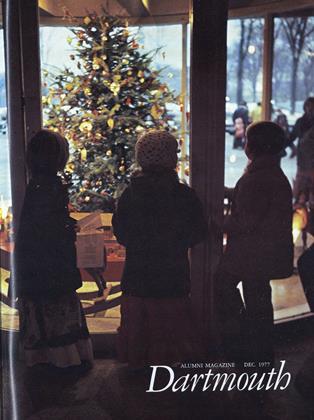The question is: Are Dartmouth students as Emile Coue had it every day in every way getting better and better, or could Dartmouth professors be getting softer and softer? And are some more indulgent than others?
For whatever reason, the gentleman’s “C” has gone the way of plus-fours and bathtub gin, and in some disciplines the gentleman’s “B” is a good cut below the average grade.
Grade inflation, as it’s known nowadays, is of increasing concern not only at Dartmouth but throughout the educational community. Some attribute it to the test-taking skill of current undergraduates, some to the pressure of graduate-school admissions, others to a general lowering of standards.
At last month’s meeting of the executive committee of the faculty of arts and sciences, Registrar Douglas Bowen reported that the inflation, which was curbed to some extent during the 1975-76 academic year, took on renewed vigor last year. In a detailed 24-page report of grades by year, term, course, department, and division, the gist of it all was that grade 'point averages for regular full-time un- dergraduates was on a 4.0 scale 3.001 during 1973-74, 3.067 for 1974-75, 3.046 for 1975-76, and 3.063 last year. The Humanities Division was the greatest offender or the most perceptive of latent talent, depending on one’s point of view or discipline. The GPA for all humanities courses was 3.185, as opposed to 2.937 for the natural sciences, and 3.008 for social sciences. For courses in interdisciplinary programs, it was even higher: 3.287. The results, Bowen commented, “suggest that the approach to grading in the humanities is, on average, quite different from that of the other two divisions.” While conceding that it was his responsibility neither to analyze reasons nor to suggest remedies, he did note that “I am relatively sure that the difference cannot be explained by overall superiority of students enrolled in humanities courses.”
Inflation is evident, too, in the percen- tage of students elected to Phi Beta Kappa. The number had risen to 199 of 846, or 23.5 per cent, of 1973 graduates. When the level was maintained the following year, with 23.4 per cent of the graduating class making Phi Beta Kappa, the faculty decreed a 10 per cent limit. The rule held for two years, but by last June the percen- tage had crept up again to 13.7.
The question remains, and it’s a sticky question involving academic freedom, or the professor’s right to conduct his classes without administrative interference. Are all Dartmouth students brighter than they used to be? Are humanities students brighter, more motivated, or better taught than their peers in science or social sciences?
Only God and their professors, closeted with their red pencils, know for sure.
 View Full Issue
View Full Issue
More From This Issue
-
 Feature
FeatureA Story: His Grandmother and Vincent
December | January 1977 By Howard Webber -
 Feature
FeatureThe Well-Tempered Synclavier
December | January 1977 By Woody Rothe -
 Feature
FeatureReflections on an $8-million post office The Hopkins Revolution
December | January 1977 By Henry B. Williams -
 Article
ArticleResident Rotiferologist
December | January 1977 By S.G. -
 Class Notes
Class Notes1971
December | January 1977 By THOMAS G. JACKSON -
 Sports
SportsThe Coach Departs
December | January 1977 By Brad Hills ’65







